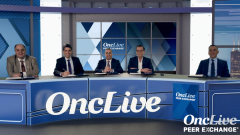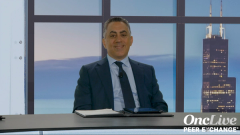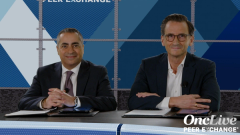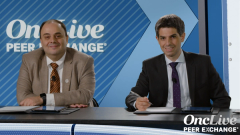
Early-Stage HCC: What is the Role of Neoadjuvant Therapy?
Expert oncologists consider when it would be appropriate to use neoadjuvant therapy for early-/intermediate-stage hepatocellular carcinoma.
Episodes in this series

Transcript:
Tanios Bekaii-Saab, MD: Mark, we have all this work in every GI [gastrointestinal] cancer we treat, and we're moving the adjuvant treatment more into a new adjuvant setting for many obvious reasons. What's happening in the world of liver cancer?
Mark Yarchoan, MD: I can't think of other tumor types where you have response rates of 30% with systemic therapy—where there isn't some incorporation of systemic therapy into either the adjuvant or the neoadjuvant portion with curative intent. Hopefully, we'll get there with HCC [hepatocellular carcinoma]. I think there've been a couple of PD-1 neoadjuvant studies now in HCC: 1 from the Mount Sinai group, 1 from the MD Anderson [Cancer Center] group, and 1 from our group, and actually the findings are fairly consistent. These agents appear to be safe neoadjuvantly, and they're associated with major pathologic responses in somewhere between 20% and 30% of patients, depending on the study you look at. The 1 thing that is very clear is that the patients who respond to systemic therapy, who then go to surgery—those patients tend not to recur. There's a question of whether you've truly changed the biology or whether these patients were going to do well anyway. We haven't answered that question. Right now, new adjuvant therapy remains something that I would put in the experimental realm, so I would not have offered this patient neoadjuvant therapy off of a clinical trial. That being said, I think we can look at the available data, and if you have a really borderline patient for surgery, then it's reasonable with the data today to put them on systemic therapy, test the biology a little bit, and if they do very well, consider them for resection down the road. In our study, we included patients treated with neoadjuvant cabozantinib and nivolumab. We included patients who had major vessel involvement and patients with multifocal disease. These are patients who normally wouldn't go to surgery, but if they did OK with systemic therapy, they could proceed to surgery. It suggests that systemic therapy can broaden the number of patients getting to resection.
Tanios Bekaii-Saab, MD: What would be an end point, though? That's 1 of the things we struggle with to inform us about a go, no-go to the next randomized study in your viewpoint. What would make sense for us to look for and say, this is a regimen worthwhile moving to the next randomized study?
Mark Yarchoan, MD: In our center, we've really focused on understanding biology because when you take a patient to surgery, you get this large piece of tissue that you can't get with serial biopsy. It's a way to understand mechanism of response and resistance in HCC. Answering the clinical questions is harder. We're not at the point where major pathologic response is a defined end point in HCC like it is with breast cancer.
Transcript edited for clarity.










































